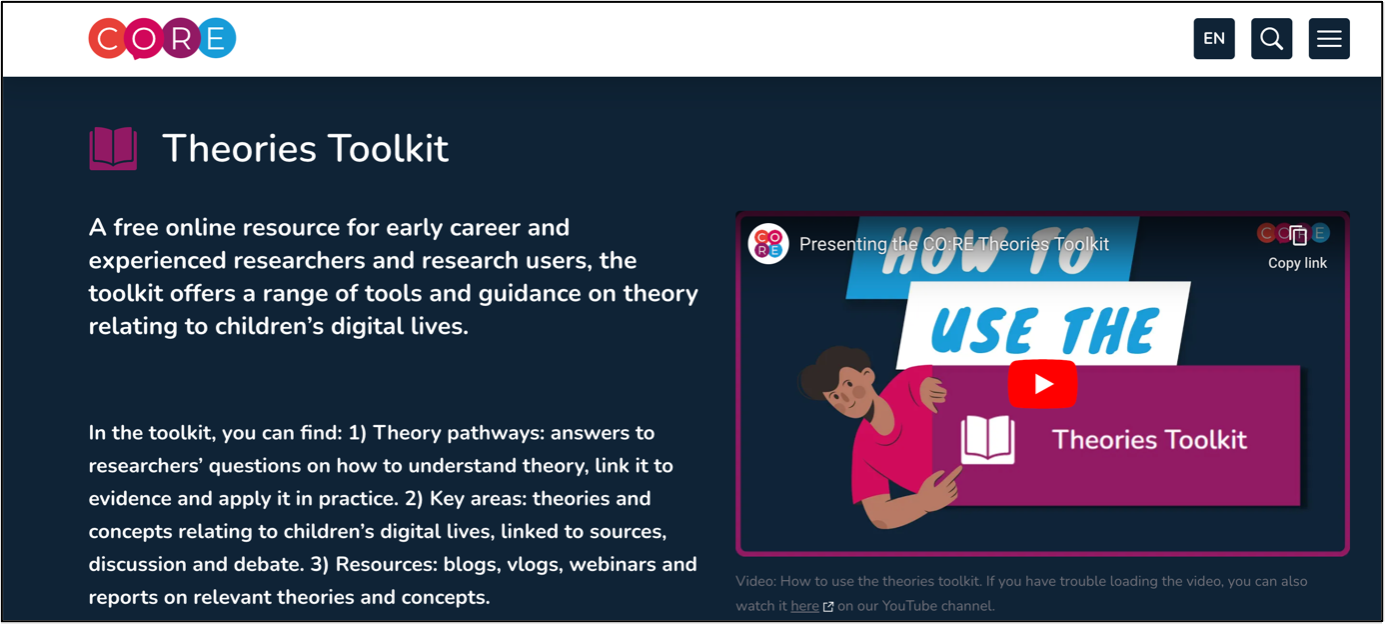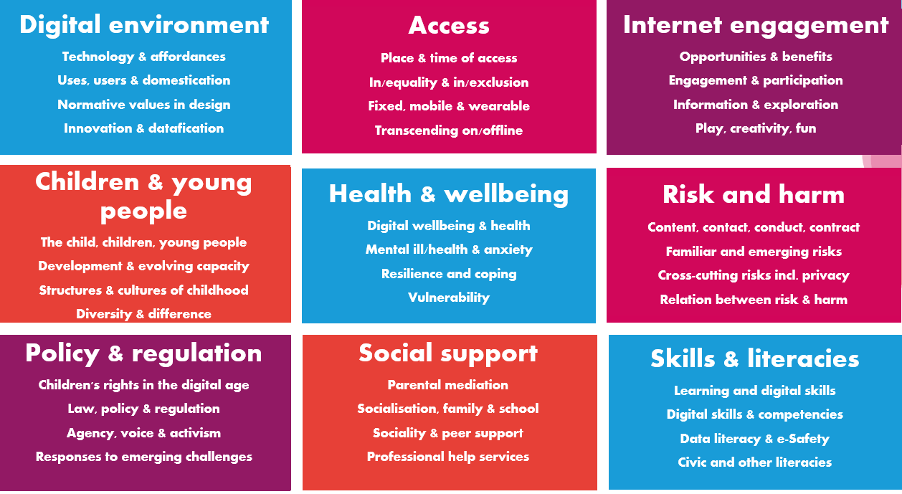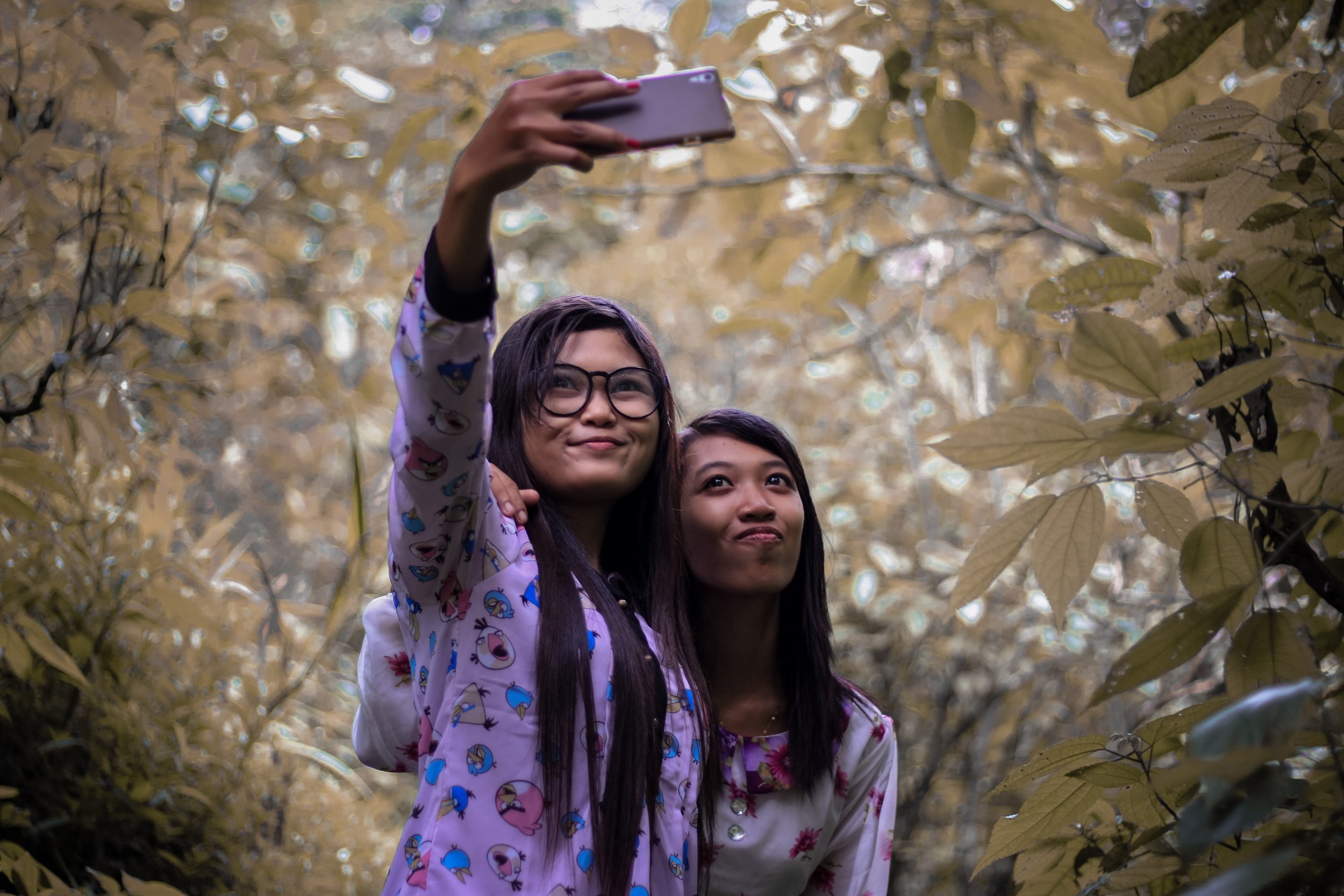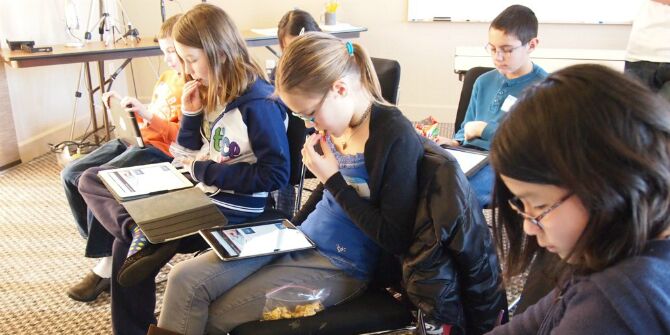
 To mark the publication of the CO:RE Theories Toolkit, LSE’s Sonia Livingstone and Mariya Stoilova explain why researchers working on understanding children’s digital lives need theory as well as evidence.
To mark the publication of the CO:RE Theories Toolkit, LSE’s Sonia Livingstone and Mariya Stoilova explain why researchers working on understanding children’s digital lives need theory as well as evidence.
“I don’t have one key theory. That in itself probably deserves some serious reflection.”
“A theory is just a flashlight to look for possible factors that should be taken into account in trying to explain or change something.”
“Theory is like a warm, comfortable blanket that you can draw on top of all your chaotic empirical findings.”
“Theories are tools and I need different tools for different types of research.”
Over the past three years, we have been building a “theories toolkit” for the international community of researchers and research users concerned with understanding children’s digital lives. Funded by the European Commission as part of the CO:RE (Children Online: Research and Evidence) project, we first had to figure out what a theories toolkit could be and who might want it.
We consulted a lot of people in making this toolkit – including early career and more experienced researchers and research users from multiple disciplines and countries. We heard a fair few anxieties about “doing theory” and a lot of uncertainty about choosing and using the multitude of theories and concepts available. Researchers were also generous in sharing their insights and decisions about theory and brimming with commitment to make research on children’s digital lives as valuable and compelling as possible.
 The toolkit aims to empower researchers and research users to use theory
The toolkit aims to empower researchers and research users to use theory
It provides a practical and comprehensive guide to researchers and research users to create, use and communicate theory. And it seeks to make working with theory a creative, engaging and collaborative experience.
In common with many areas of research in media and communications, research with children about all things digital is burgeoning. Researchers, policymakers, practitioners and the public all want to understand how children engage with digital technology, what difference it makes, and what actions should be taken. Although the call is often for the latest evidence, our experience is that all these stakeholders greatly wish for better understanding. They want to know what terms to use, how to interpret the debates, how to bring the plethora of research findings together, and to think about how we got here. Certainly, they want to be equipped to ask where are we going, how is childhood changing in the digital age. So, even though many may fear theory or disregard it as supposedly not practical, theory is vital.
We are proud to announce the completion of a flexible resource designed to meet diverse needs and offer multiple entry points and pathways – from identifying key concepts and debates to creating theory and linking it to evidence, to disseminating ideas and engaging stakeholders, to informing policy and practice, to revising theory and starting again.
Watch here to see how to use the toolkit, which includes:
- Theory pathways: answers to researchers’ questions on how to understand theory, link it to evidence and apply it in practice.
- Key areas: theories and concepts relating to children’s digital lives, linked to sources, discussion and debate (see the image below).
- Resources: blogs explaining knotty problems, vlogs and interviews with theorists, webinars debating theories and concepts and more.
- Reading lists highlighting introductory, classic and specialised sources, mostly open-access, annotated to explain their value.
 Beyond the theories toolkit, the CO:RE platform has a wealth of further resources, including:
Beyond the theories toolkit, the CO:RE platform has a wealth of further resources, including:
- An interactive map of EU Kids Online 2020 findings for children’s online lives.
- A searchable evidence database of 1700 publications (based on 1300 research projects conducted in Europe since 2014) – all coded, with key insights translated into English.
- A comprehensive methods toolkit offering guidance on good practice and how to meet the challenges of researching children’s digital lives.
- A compass for research ethics – with a great video for children explaining consent.
- An accessible toolkit for educators to engage with research.
CO:RE is discussing how its knowledge base can strengthen the bridge between researchers and decision makers this week. We believe such discussions are crucial to ensure that European policy regarding children’s digital lives is evidence-based. And as authors of CO:RE’s Theories Toolkit, of course we also agree with Kurt Lewin that “there is nothing as practical as a good theory”. The trick is to bring it all together.
This post represents the views of the authors and not the position of the Media@LSE blog nor of the London School of Economics and Political Science.
Featured image: Photo by PAN XIAOZHEN on Unsplash





